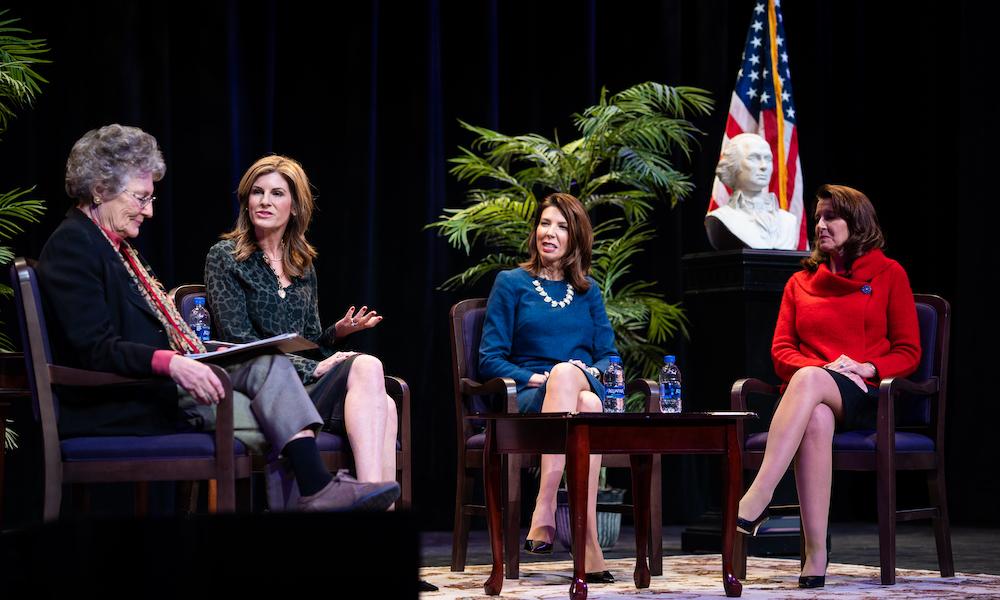Leading the organization
C-suite alumnae talk business
Business
SUMMARY: Jennifer Morgan, Carrie Owen Plietz and Kathy Warden, Fortune 500 executives and JMU alumnae, returned to campus Feb. 6 to participate in a panel discussion as part of the Madison Vision Series.
By Janet Smith (’81) and Khalil Garriott (’04)
Three Fortune 500 executives and James Madison University alumnae—Jennifer Morgan (’93), Carrie Owen Plietz (’97) and Kathy Warden (’92)—shared personal experiences on their paths to the C-suite and offered advice to students and other audience members Feb. 6 in Wilson Hall Auditorium.
Bobbie Kilberg, longtime leader of the Northern Virginia Technology Council, moderated the panel discussion on “The Future of Work,” part of the Madison Vision Series: Contemporary Issues in an Engaged Society.
“I don’t know that I ever had a master plan to get to where I am,” said Morgan, co-chief executive officer of SAP, the world’s largest provider of enterprise application software. “Many times in life when we’re faced with decisions, we tend to evaluate them in a very permanent way. When we do that, we lose sight of all the beautiful forks in the road.”
Plietz, executive vice president and chief operating officer of the hospital division of WellStar Health System, enrolled at JMU as a dance major, but she switched to health services administration because “I always knew that my passion was in health care,” she said. From her first job as a patient advocate to today’s COO role, Plietz has viewed herself as a helper. “I’m so thankful every single day to take care of the people who are taking care of patients.”
Warden entered JMU as a pre-law student, quickly realized that the profession was not for her and majored in computer information systems. Now the chairman, chief executive officer and president of Northrop Grumman and a member of the JMU Board of Visitors, Warden said, “I draw passion from having a purpose and doing work that matters.”
Warden, a member of the Business Roundtable, a nonprofit association of CEOs of major U.S. companies, pointed to the redefining the purpose of a corporation in 2019 as an example of a major change in business. Warden is one of 181 CEOs who signed the statement, which moves away from shareholder primacy to include a commitment to all stakeholders, including customers, employees, suppliers and communities.
“Clearly, employees create the value of a corporation,” Warden said. “Our workforce is so much more diverse today.”
Plietz said health care is inherently diverse. “I’m very proud of the work the (WellStar) board and the leadership team has done,” she said, adding that workforce diversity and inclusion of voices must be intentional and led by top officials and administrators.
Morgan agreed that inclusion is important in today’s business world. “You hear the word empathy a lot more,” she said. Leaders must have empathy to ensure employees feel valued and committed to staying with the company.
Asked about the “hot jobs” of the future, Plietz quickly said, “health care.” Noting that people entering the job force today can expect to hold 10 to 15 different jobs in their careers, she said a liberal arts education is key to navigating that reality. “It’s the level of agility, leadership, creativity, critical thinking, engagement, teamwork and relationship-building ... That’s the skill set for the future.”
Warden said the jobs of today and the near future require that everyone be comfortable with data and literate in technology and leadership.
Asked about their experiences with “the glass ceiling” during the audience questions portion of the discussion, each woman offered advice.
“You push past it and you call it out,” Plietz said.
Morgan said, “I’ve worked for some really great men,” adding that she has had males as sponsors, rather than mentors. “Mentors are people who give you advice,” she said. “Sponsors are people who pull you along, challenge you and push you.”
“Progress is made when people (who are) helped help others,” Warden said.
The next Madison Vision Series presentation on April 7 will feature Farah Pandith, former U.S. Special Representative to Muslim Communities and bestselling author. She will speak at 6 p.m. in Wilson Hall Auditorium. The event is open to the public.
The series honors James Madison’s conviction that cultivating an informed and educated citizenry is essential to the health of our republican democracy. The series brings scholars, thinkers and leaders of all kinds to campus for lively explorations of issues facing our society. It is supported by the Madison Vision Fund.
